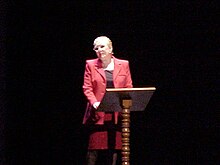Lola Herrera
This biography of a living person needs additional citations for verification, as it includes attribution to IMDb. (August 2012) |
Lola Herrera | |
|---|---|
 Herrera in "48 Voces" in Puerto del Rosario, Fuerteventura on January 29, 2001. | |
| Born | María Dolores Herrera Arranz June 30, 1935 |
| Occupation | Actress |
| Years active | 1964–present |
| Spouse(s) | (divorced) |
| Children | 2 |
| Awards | Indianapolis International Film Festival Special Jury Prize for Best Performance 2002 TP de Oro Best National Actress 1977 1979 La Barraca 1980 Fotogramas de Plata Best Actress 2005 2006 Solas Complete career in stages 2007 |
María Dolores Herrera Arranz MML (June 30, 1935) better known as Lola Herrera is an awarded Spanish actress.
Biography[]
She was born in the Barrio de Las Delicias, Valladolid, Castilla y León. She started in the world of music, but in the 1950s, she went to Madrid and took part in her first movie El pórtico de la gloria (1953).
In the 1970s, she took part in several theatrical plays for Televisión Española. She was one of the habitual actors of the cast of Estudio 1 and collaborated with Chicho Ibáñez Serrador in Historias para no dormir (1968). She also worked as a voice actress in dubbing Spanish versions made in studios like or Exa (Madrid).
She is mainly known for her appearances in television series like La casa de los líos or Un paso adelante, but she has taken part in several movies like El amor perjudica seriamente la salud, and in theatrical plays like Cinco horas con Mario, based in a Miguel Delibes novel.
She married the actor (’s son) in 1967. They had two children, Natalia and Daniel, before their divorce. Natalia Dicenta is also a famous actress, and they both have worked together in plays like "All About Eve" or Solas.
Selected filmography[]
Television[]
- Un paso adelante (2002–2005)
- La casa de los líos (1997–2000)
- Paraíso
- El momento de la verdad (August 16, 2000)
- El grupo (2000)
- (1979)
- La Barraca (1979)
- (1977)
-
- Mister George (January 1, 1976)
-
- Hay una luz sobre la cama (October 28, 1974)
- Verano y humo (November 25, 1974)
-
- Los ojos de la pantera (May 20, 1974)
-
- Los tres etcéteras de Don Simón (May 3, 1974)
-
- Juan Español, aprensivo (November 22, 1972)
- Juan Español y Lolita (October 1, 1973)
-
- Acuario (January 1, 1972)
-
- El que a hierro mata, a hierro muere (May 26, 1971)
-
- Yanko, el músico (May 6, 1971)
- Adolescencia (February 19, 1972)
- El recluta (March 11, 1972)
- Las paredes oyen (October 29, 1973)
-
- Gente divertida (March 1, 1971)
-
- La trampa (November 9, 1970)
- Mientras llega la noche (January 9, 1971)
-
- Todos eran de Toronto (June 20, 1969)
- Qué solo me dejas (July 18, 1969)
-
- La herida (January 10, 1969)
- Los zapatos (June 25, 1969)
- El Premio
- La saga (December 2, 1968)
-
- El cuervo y el zorro (April 14, 1968)
- Historias para no dormir
- La casa (January 1, 1968)
- El trasplante (March 15, 1968)
-
- Aries (December 2, 1967)
-
- La noticia (October 8, 1967)
-
- Por favor, compruebe el futuro (September 16, 1967)
- , several theatrical plays from 1964 to 1978.
Film[]
- Cristina Guzmán (1968)
- La Graduada (1971)
- The Cannibal Man (1972)
- La próxima estación (1982)
- Love Can Seriously Damage Your Health (1997)
- Pasaje al amanecer (2017)
Awards[]

Stage[]
- Max de las artes escénicas, Solas in 2006,
- Fotogramas de Plata, in 2006
- Fotogramas de Plata, in 2005
- Premio Ercilla de Teatro for her complete career in stages.
Television[]
Honours[]
- Gold Medal of Merit in Labour (Kingdom of Spain, 2 December 2006).[1]
External links[]
- Lola Herrera at IMDb
References[]
- 1935 births
- Living people
- People from Valladolid
- Spanish stage actresses
- Spanish film actresses
- Spanish television actresses
- Spanish voice actresses
- 20th-century Spanish actresses
- 21st-century Spanish actresses